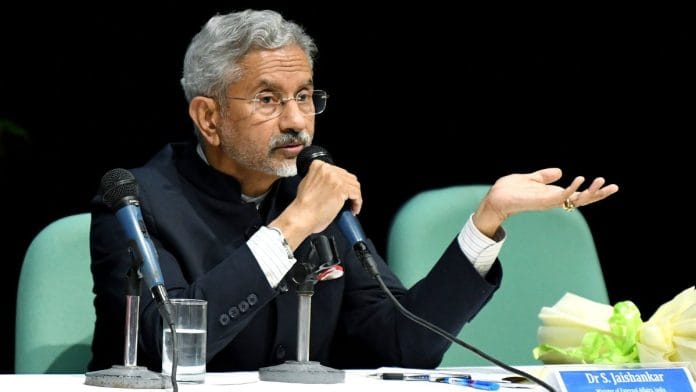New Delhi: For External Affairs Minister S. Jaishankar, Beijing’s actions in Galwan valley have made it much harder to work together, as “you cannot have a standoff on the borders” and then be expected to “go to the next room” and discuss something else.
Beijing’s actions in Galwan in 2020 disregarded almost 30 years of agreements on the border issues between New Delhi and Beijing, which has impacted India’s relationship with the country at a multilateral and plurilateral level, said Jaishankar, speaking Monday at the Pandit Hriday Nath Kunzru Memorial Lectures 2024 at the Jawaharlal Nehru University.
“Almost for 30 years no blood had been shed on the border, there were a series of agreements. They may not have been observed 100 percent, but essentially they kept the border relatively calm and stable,” he said.
“Now by disregarding those agreements, especially the 1993, 1996, 2005 and 2012 (agreements), the Chinese have created a new situation on the border. Our only response at that time was to counter-deploy in strength on the Line of Actual Control (LAC),” added Jaishankar.
Ties between China and India have remained strained since the clashes between the two armed forces in Galwan valley, in Ladakh in 2020. Since then, Chinese forces have tried to attack and capture Indian positions in eastern Ladakh at least twice between September 2021 and November 2022, as reported by ThePrint earlier.
Also Read: Jaishankar fields questions on India-China ties, ‘decolonisation’ of UN at Raisina Dialogue
‘Dice loaded in favour of the West’
Building on his comments from the Munich Security Conference, earlier in February, Jaishankar laid out the paradigm within which India is focusing on multi-vector relationships with different countries that suit its own needs.
“In many ways, if you look at our societal attributes, they are not in discordance with the Western world…The problem for us is, while we share many of these attributes, the world order is still one broadly engineered after the Second World War, but which carried all the advantages of the period of imperialism and colonialism before that,” asserted Jaishankar.
He added: “So the dice is loaded in many ways in favour of western countries. As a rising power, we want space, we want a say, we want more rights, we need to build more capability. At one level you agree with them (the West) on many things, but at another you have to fight and contest, and argue and push to get that space and that place.”
The minister, however, pointed out that New Delhi must be careful to not be “drawn” to an anti-West stance, as it may inadvertently support those who are not keen to see a rising India. “We have to walk this with great skill and sensitivity,” he said.
“Today how do we prepare, how do we find the right combination of players for a particular objective? It creates a very differentiated landscape — you can have the Quad (Quadrilateral Security Dialogue), but you can have the Shanghai Cooperation Organisation (SCO), you can have the India Middle East Europe Economic Corridor (IMEC), you can have the Chennai-Vladivostok Maritime Corridor,” said Jaishankar.
The Quadrilateral Security Dialogue consists of India, Japan, Australia and the US, while the SCO consists of Russia, China, Iran, Kazakhstan, Kyrgyzstan, Tajikistan, Uzbekistan, India and Pakistan.
In a similar vein, the IMEC is a proposed corridor that would connect India to Europe via the Middle East, while the Chennai-Vladivostok Maritime Corridor would connect the southern port of Chennai to Vladivostok on Russia’s Pacific coast.
“The country which is able to derive the most, by participating in the most, but not at the cost of your core interests…That today has become the foreign policy exercise,” explained Jaishankar.
(Edited by Richa Mishra)
Also Read: Ahead of Lok Sabha polls, Jaishankar assures EU of continuity of Modi govt






